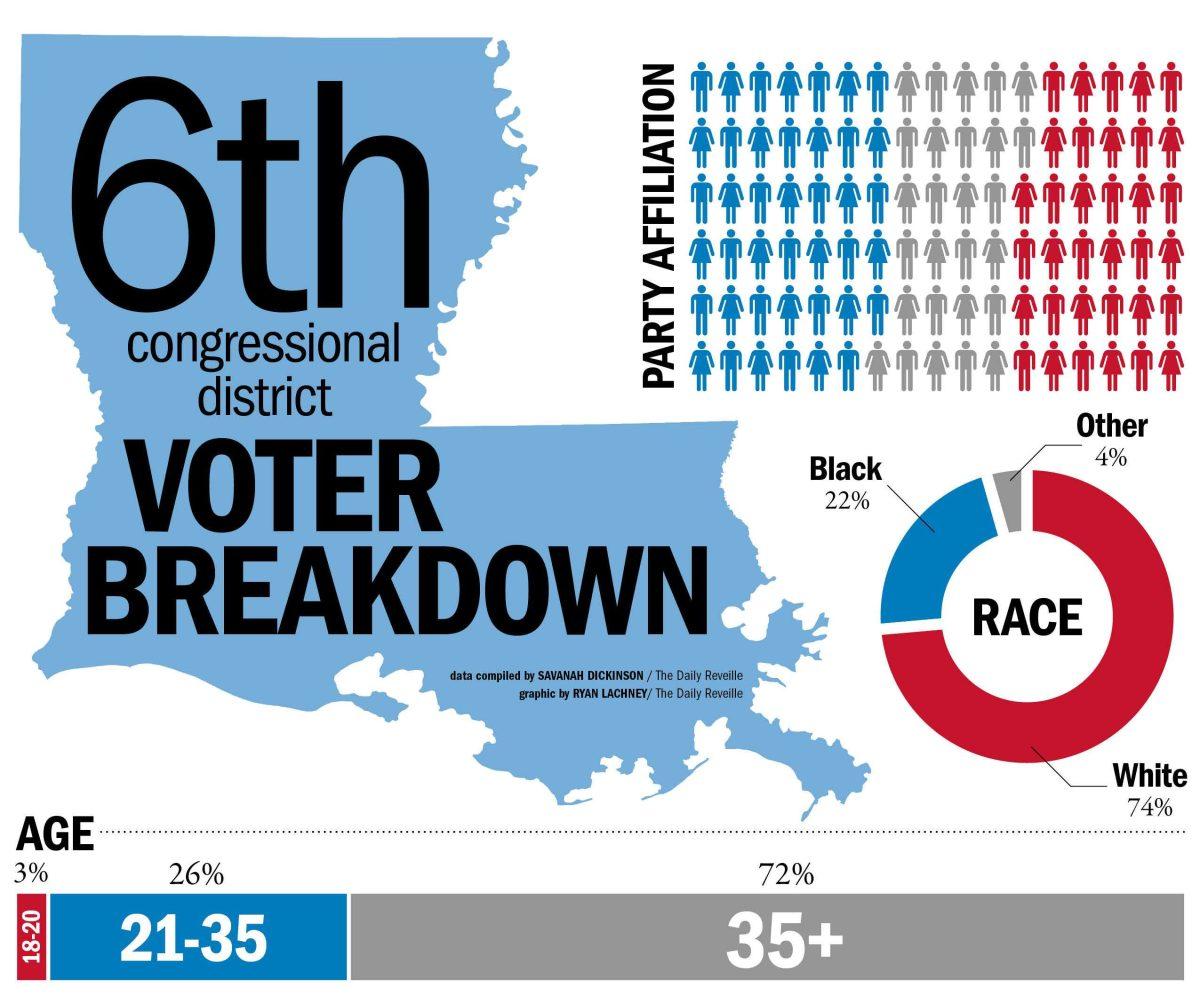With less than three weeks until Election Day on Nov. 4, candidates for Louisiana’s 6th District congressional seat are counting on the votes of students they worked to rally throughout their campaigns.
Since the start of the race, the University has seen an onslaught of student groups and campaign interns supporting candidates ranging from a 28-year-old University alumnus to an 87-year-old former governor and convicted felon.
Campaign managers for Republican state Sen. Dan Claitor, Republican Paul Dietzel II, Democratic former Gov. Edwin Edwards and Republican Garret Graves emphasized the importance of University students in the next stage of the race.
“LSU, being 30,000 people, is an interesting place because it’s a small town in and of itself,” said Ari Krupkin, Edwards’ campaign manager. “I think it’s very important to realize that that is a huge voting bloc.”
Kevin Roig, manager of Graves’ campaign, said his team placed an emphasis on organizing younger voters from day one, recruiting volunteers at the University, Nicholls State University and local high schools.
“Our success has largely been due to their efforts,” Roig said.
Claitor’s campaign manager Brent Robertson said his strategy for recruiting younger voters relied on targeting millenials who chronically voted since they registered, using voting histories from the 2010 midterm elections.
“We really targeted to see who in that age group voted in 2010 because there’s a high likelihood that they would vote in this non-presidential midterm,” Robertson said. “As far as direct voter contact from our campaign, they’ll get a knock on their door, a phone call and two or three pieces of mail.”
Despite the presence of student political organizations, the campaigns’ efforts to energize youth support have not eliminated voter apathy on campus.
Samantha Marshall, a kinesiology freshman, registered to vote in August but was unaware of the Nov. 4 elections. She said she plans to vote in future presidential elections.
Interdisciplinary studies senior Matt Chatelain also registered to vote but did not know the names of any of the 6th District candidates.
“I usually just look up [the candidates] before,” Chatelain said. “But I don’t get around to making a decision till late.”
John Garrett Clawson, a political science and sociology junior, said he did not expect a high youth turnout on Nov. 4.
Clawson is president of Common Sense Action LSU, a student political organization which registers young voters and promote bipartisan values.
“It’s just because the hype around presidential elections is much more prominent than it is for midterms,” Clawson said. “A lot of people don’t feel like their vote matters.”
J Hudson, Dietzel’s campaign manager, urged college students to turn out on Election Day.
“As students at LSU, their vote really does affect what goes on and where they live currently,” Hudson said.
Hudsonsaid he plans to emphasize voters who have committed to Dietzel’s candidacy in the final stretch of the race — executing an intense get-out-the-vote strategy.
“When we get to get-out-the-vote, we’re not going to be flying blindly like most of the other campaigns,” Hudson said. “We’re going to be calling people that are pro-Dietzel, that they want to go vote for Dietzel, and we’re going to make sure they get out the polls to vote for Dietzel.”
Hudsonplans to allocate a significant amount of campaign contributions to get-out-the-vote.
“We’ll be using a lot of that money to make sure that our voters get to the polls,” Hudson said.
Krupkin said the Edwards campaign will use its war chest funds to invest in advertising in upcoming weeks, and the campaign will be cautious with its spending.
“I don’t think that we will necessarily blow up the airwaves with ads,” Krupkin said. “Especially given a possibility of a runoff, you’ve got to be smart with what you spend your money on, and that’s what we’re doing.”
Edwards, one of two Democrats running, is expected to make it to the runoff election Dec. 6 with a Republican challenger.
“I have not seen one poll that does not have Edwin Edwards making the runoff,” Clawson said.
Roigsaid his campaign’s endgame involves a comprehensive plan maximizing “time, information, money and people.” Roig plans to spend contributions on TV ads, radio spots and door-to-door efforts.
Robertson said a campaign’s goal in the last 30 days of a race is to reach as many people as possible, and stressed the importance of using campaign funds to finance direct mailing efforts.
The Claitor campaign looks at recipients’ party affiliation and past involvement in advocacy groups when delivering mail, Robertson said.
“We can message them based upon what they care about,” Robertson said.
Krupkin said the start of the race’s final countdown already has a noticeable effect on the morale of his campaign.
“I think there’s a hum and a buzz. I think there’s an excitement,” Krupkin said.
Robertson said the Claitor team is already working longer hours and knocking on doors later than usual.
“You just kind of feel the intensity,” Robertson said. “It’s the fourth quarter. It’s a tight ball game.”
Congressional campaigns gear up for final stretch
October 14, 2014
La. 6th congressional district campaigns get out student votes in their final election 2014 push.
More to Discover








